May 25, 2018 •
News You Can Use Digest – May 25, 2018
Federal: The Princes, the President and the Fortune Seekers Seattle Times – Desmond Butler and Tom LoBianco (Associated Press) | Published: 5/21/2018 Two Americans sought to leverage access to President Trump while angling for lucrative contracts from two Gulf countries […]

Federal:
The Princes, the President and the Fortune Seekers
Seattle Times – Desmond Butler and Tom LoBianco (Associated Press) | Published: 5/21/2018
Two Americans sought to leverage access to President Trump while angling for lucrative contracts from two Gulf countries wanting to shift U.S. foreign policy against Qatar. Republican fundraiser Elliott Broidy and businessperson George Nader reportedly worked to catch the president’s ear by passing along praise from the princes of the United Arab Emirates and Saudi Arabia. Broidy and Nader, who marketed themselves as having a back channel to the Oval Office, sought million-dollar contracts with the two Gulf countries for their efforts, according to the Associated Press investigation. The AP previously reported that Broidy and Nader sought to pass an anti-Qatar bill through Congress, while trying to hide their money trail related to such efforts. Nader is now reportedly cooperating with special counsel Robert Mueller’s team of investigators, who are said to be examining foreign influence inside the Trump White House.
Trump Violated the Constitution When He Blocked His Critics on Twitter, a Federal Judge Rules
Tampa Bay Times – Brian Fung and Hamza Shaban (Washington Post) | Published: 5/23/2018
U.S. District Court Judge Naomi Reice Buchwald ruled President Trump cannot block people from viewing his Twitter feed over their political views. Buchwald said the president’s Twitter account is a public forum and blocking people who reply to his tweets with differing opinions constitutes viewpoint discrimination, which violates the First Amendment. The government does not dispute that Trump blocked the Twitter users for political reasons, but the Justice Department had argued the president was largely acting in a personal capacity. Buchwald did not order Trump to unblock his followers, saying clarification of the law is sufficient to resolve the dispute. Should the president ignore the ruling, analysts say, future litigation could force Twitter to unblock Trump’s followers unilaterally.
Washington Lobbyists Put on Notice Over Foreign Agent Law
Associated Press – Chad Day and Eric Tucker | Published: 5/22/2018
The prosecution of a Pakistani man in Maryland reflects what current and former U.S. Justice Department officials say is an aggressive enforcement strategy against unregistered foreign agents that began even before special counsel Robert Mueller’s investigation exposed a shadowy world of international influence peddling. Officials say they are not interpreting any differently the little-known law called the Foreign Agents Registration Act, which requires people to disclose when they lobby in the U.S. on behalf of foreign governments or political entities. But they have been taking a more aggressive approach, asking more probing questions of people and firms they suspect need to register, requesting more documents, and conducting investigations with an eye toward bringing criminal charges when appropriate.
From the States and Municipalities:
Alabama: Reform Commission Begins Work on Alabama Ethics Law
AL.com – Mike Cason | Published: 5/17/2018
A committee created to propose changes to the law governing ethics for Alabama officials, public employees, lobbyists, and others is aiming to have a proposal ready in October, allowing time to fine tune it before the 2019 legislative session starts March 5. Deputy Attorney General Mike Duffy was the main author of an ethics bill that was introduced during the 2018 legislative session. Lawmakers decided to set it aside and created the Ethics Reform Commission with the goal of passing reforms next year. Duffy said meetings with people affected by the law helped identify areas of concern that were addressed in the bill, such as more clearly defining who is considered a “principal.”
Arizona: Array of Arizona Politicians, Lobbyists Connected to Bribery Case
Arizona Capitol Times – Katie Campbell | Published: 5/18/2018
The trial of a former regulator, a utility owner, and a lobbyist has tentacles that stretch to many others in Arizona’s political universe. Eighty-two prospective witnesses may be called to testify at the trial scheduled to begin May 30. Former Arizona Corporation Commissioner Gary Pierce and his wife, Sherry, along with lobbyist Jim Norton and Johnson Utilities owner George Johnson, face charges of felony conspiracy, bribery, and fraud. Barry Aarons, who has lobbied at the Legislature for 40 years, said the public is in for a bad impression of Arizona politics no matter the outcome of the trial. “It reinforces that sense people have that the whole thing is corrupt,” said Aarons.
Florida: Florida’s Porous Campaign Finance Laws: ‘You can do almost anything’
Tampa Bay Times – Gary Fineout (Associated Press) | Published: 5/21/2018
So far, at least $13 million has been spent on television ads in the Florida governor’s race that includes six candidates vying for the job that will be vacated by Rick Scott. Television ads are poised to play a crucial role in the race since polls continue to show a majority of the state’s voters do not really know the Republican or Democratic candidates vying to replace him. Some of the ads are being paid for by groups that insist they have no legal obligation to disclose who is paying for them. Other ads are being coordinated with campaigns relying on their own legal interpretation to sidestep laws and rules intended to place limits on ad campaigns being funded by large donors. Mark Herron, an election law attorney based in Tallahassee, said: “You can do almost anything in Florida if you put it in the right bucket.”
Florida: Want to Speak at a Miami Beach Meeting? For Business Owners, That Could Cost $850
Miami Herald – Kyra Gurney | Published: 5/24/2018
Businesses owners who want to speak to public officials in Miami Beach are required to register as lobbyists under Miami-Dade County law and the city charges lobbyists a $500 registration fee plus $350 for each issue on which they plan to lobby. Most cities waive lobbying fees for business owners speaking on their own behalf. While the Miami Beach fees might not be a problem for big businesses and the lobbying firms hired to represent them, they have deterred several “mom-and-pop” business owners from speaking at a city commission meeting.
Georgia: Stacey Abrams Wins Georgia Democratic Primary for Governor, Making History
MSN – Jonathan Martin and Alexander Burns (New York Times) | Published: 5/22/2018
Georgia gubernatorial candidate Stacey Abrams won the Democratic primary, bringing her a step closer to becoming the nation’s first African-American woman governor. By defeating Stacey Evans, Abrams also became the state’s first black nominee for governor. The general election is sure to draw national attention as voters determine whether a black woman can win in the Deep South, a region that has not had an African-American governor since Reconstruction. Abrams has signaled she is unlikely to spend much time persuading rural whites to return to a Democratic Party they have largely abandoned. She has embarked instead on a strategy of energizing a coalition of young and nonwhite Georgians who represent a growing share of the state’s population.
Louisiana: New Orleans City Council to Investigate Entergy for Paying Actors to Lobby for Power Plant
New Orleans Times-Picayune – Beau Evans | Published: 5/18/2018
In the wake of Entergy’s admission of waging an “astroturf” lobbying campaign leading up to the approval of a power plant in New Orleans, the city council will change public comment cards and introduce legislation to require lobbying groups register. Entergy conducted an internal investigation that found one of its contractors, Hawthorn Group, hired Crowds on Demand, which admitted to paying actors to testify in support of the power plant. The investigation also found Entergy’s contractors coordinated to have other people paid to sit in the audience of a council meeting to show support for the plant with handmade signs.
Maine: Legislative Typo Threatens to Undermine Clean Elections Campaigns
Lewiston Sun Journal – Kevin Miller (Portland Press Herald) | Published: 5/21/2018
Maine lawmakers left dozens of measures in limbo when they adjourned the 2018 legislative session. Advocates for the state’s public campaign finance system and a state ethics commission official warn that a little-noticed victim of the partisan rancor could have significant financial ramifications for the November 2018 elections. Lawmakers failed to pass a routine “errors and inconsistencies” bill to correct unintended budget language that prevents the ethics panel from disbursing additional money to clean elections candidates starting on July 1. As a result, more than 200 legislative candidates and potentially three gubernatorial campaigns will be unable to tap into at least $3 million, money that lawmakers already have budgeted for the public campaign finance system, in the final months of the election season.
Missouri: Missouri Lawmakers Can Keep Accepting Lobbyist Gifts After Failing to Pass Amendment
Kansas City Star – Allison Kite and Jason Hancock | Published: 5/18/2018
Missouri lawmakers can keep accepting free meals, drinks, and event tickets after the House defeated a proposed constitutional amendment. Sen. Jason Holsman had sought to ban lobbyist gifts and alter legislative term limits. The House brought up the proposal in the last hour of the legislative session only to move on moments later after some lawmakers tried to attach tried to attach amendments and sink the proposal. When the session ended, the proposal died.
Montana: Appeals Court Upholds Montana Campaign Finance Reform Law
Washington Times; Associated Press – | Published: 5/23/2018
A three-judge panel of the Ninth U.S. Circuit Court of Appeals said Montana’s 2015 law to increase campaign reporting and disclosure meets constitutional muster. A group called Montanans for Community Development was unwilling to register and disclose its donors and spending as required under the statute. The appeals panel called the group’s constitutional claims against the law “scattershot.” It also called the group’s argument “absurd” that the law’s requirement to file electronic campaign reports may be unconstitutional.
New York: From the E.R. to the Garden, M.T.A. Chief Holds Unusually Powerful Perch
New York Times – Brian Rosenthal | Published: 5/22/2018
New York Gov. Andrew Cuomo last June selected Joseph Lhota to head the Metropolitan Transit Authority (MTA). But Lhota would only agree to return to the position he held in 2012 on the condition that he could keep his full-time job as the chief of staff of one of the state’s biggest hospital networks, and also retain the prerogative to join any other paid board he wanted. While Lhota remains a respected official, his growing web of jobs has led to potential conflicts-of-interest and competition for his time, complicating the still-flailing effort to resuscitate a transit system used by millions of people every day. Nobody has ever led the MTA while balancing as many other leadership posts as Lhota.
Oklahoma: Many Felons Can’t Vote, But They Can Lobby at the Capitol
Oklahoma Watchdog – Paul Monies | Published: 5/16/2018
Questions have come up in recent years about who can be barred from becoming a registered lobbyist in Oklahoma and whether elected officials should be banned from accepting jobs as lobbyists shortly after leaving office. An Ethics Commission rule requiring a two-year waiting period before certain officials could become lobbyists was rejected by the Legislature this year, with some lawmakers saying it was unjust to deny people the freedom to seek private employment. The issue becomes trickier when it involves someone convicted of a felony. Nothing in state law or ethics rules prohibits lawmakers convicted of felonies from lobbying their former colleagues, but their ability to do so depends largely on prosecutors’ demands.
Pennsylvania: Pa. House GOP Leaders Planning to Impose Sanctions Against Rep. Nick Miccarelli
PennLive.com – Jan Murphy | Published: 5/17/2018
Pennsylvania House Republican leaders said they were moving to take away committee assignments from Rep. Nick Miccarelli, who is accused of abusing two women who dated him, including a fellow lawmaker who is now assigned a bodyguard while she is at the statehouse. The GOP leaders accused Miccarelli of repeatedly violating a caucus policy against retaliation, even after he was told several times about it. Rep. Tarah Toohil obtained a protective order against Miccarelli in March and House leaders provided her with a security escort when she is in the Capitol. The leaders said they also are moving Miccarelli’s desk on the chamber floor, so it will be farther from Toohil’s.
May 24, 2018 •
Court Upholds Montana’s Dark Money Disclosure Laws
The 9th U.S. Circuit Court of Appeals upheld Montana’s campaign spending disclosure laws this week. The three-judge panel ruled the law is not unconstitutionally vague and requiring groups spending money on electioneering communications to report their donors is proper. The […]
 The 9th U.S. Circuit Court of Appeals upheld Montana’s campaign spending disclosure laws this week.
The 9th U.S. Circuit Court of Appeals upheld Montana’s campaign spending disclosure laws this week.
The three-judge panel ruled the law is not unconstitutionally vague and requiring groups spending money on electioneering communications to report their donors is proper.
The law, proposed by Gov. Steve Bullock and passed by the Legislature in 2015, still has wide bipartisan support.
Montanans for Community Development, the group challenging the disclosure laws, asserted the requirements were vague and overly broad, giving too much enforcement discretion to the commissioner of political practices. They also argued being required to file electronic campaign reports may be unconstitutional, a point the 9th Circuit Court of Appeals called absurd.
The current commissioner, Jeff Mangan, said he and his office are pleased with the ruling.
May 23, 2018 •
Third Request for FEC to Consider Rulemaking Concerning Foreign Interference in Elections
At the May 24 meeting of the Federal Election Commission, Vice Chair Ellen L. Weintraub resubmitted proposals for the commission to reconsider concerning whether to engage in a rulemaking to protect future U.S. elections from foreign interference. As stated in […]
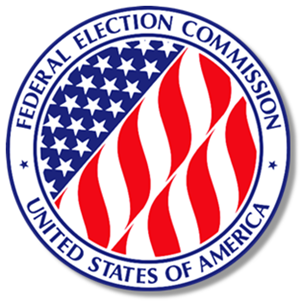 At the May 24 meeting of the Federal Election Commission, Vice Chair Ellen L. Weintraub resubmitted proposals for the commission to reconsider concerning whether to engage in a rulemaking to protect future U.S. elections from foreign interference.
At the May 24 meeting of the Federal Election Commission, Vice Chair Ellen L. Weintraub resubmitted proposals for the commission to reconsider concerning whether to engage in a rulemaking to protect future U.S. elections from foreign interference.
As stated in her May 17 memorandum to the commission, the proposals were initially brought in both September 2016 and June 2017. The impetus for her new request was a bipartisan joint statement released by Senators Richard Burr and Mark Warner, in which they both call for better efforts to combat foreign interference in federal elections.
This request to be considered at the commission’s meeting can be found here.
May 23, 2018 •
Vermont Lawmakers Reconvene for Special Session
Lawmakers reconvene today in Montpelier for a special session called by Gov. Phil Scott. The focus of the special session will be on the state budget and property tax bills passed by the General Assembly during the regular session. Gov. […]
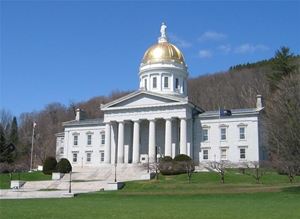 Lawmakers reconvene today in Montpelier for a special session called by Gov. Phil Scott.
Lawmakers reconvene today in Montpelier for a special session called by Gov. Phil Scott.
The focus of the special session will be on the state budget and property tax bills passed by the General Assembly during the regular session.
Gov. Scott has signaled to the Legislature his plan to veto both bills in their present form.
The West Virginia Legislature adjourned a two-day special legislative session on May 21, 2018. Lawmakers passed eight bills, including a bill creating the Department of Arts, Culture, and History. Gov. Jim Justice signed a bill in March eliminating the Department […]
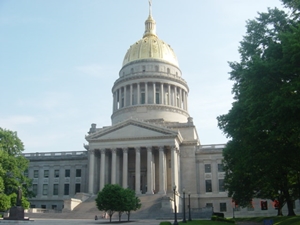 The West Virginia Legislature adjourned a two-day special legislative session on May 21, 2018.
The West Virginia Legislature adjourned a two-day special legislative session on May 21, 2018.
Lawmakers passed eight bills, including a bill creating the Department of Arts, Culture, and History.
Gov. Jim Justice signed a bill in March eliminating the Department of Education and the Arts.
Under the new bill, the commissioner of culture and history will become the curator of arts, culture, and history and report directly to the governor.
May 22, 2018 •
Oregon Legislature Adjourns One-day Special Session
The Oregon Legislature adjourned a one-day special session on May 21, 2018. The special session was called by Gov. Kate Brown to address tax breaks for small businesses. The tax plan passed 51-8 in the House and 18-12 in the […]
 The Oregon Legislature adjourned a one-day special session on May 21, 2018.
The Oregon Legislature adjourned a one-day special session on May 21, 2018.
The special session was called by Gov. Kate Brown to address tax breaks for small businesses. The tax plan passed 51-8 in the House and 18-12 in the Senate.
Both votes included Democrats who broke from their party to vote against the measure.
South Carolina lawmakers will return to the State House this week to deal with unfinished legislative business after legislators extended the 2018 sine die adjournment date for the General Assembly. Each house stands adjourned to meet in a two-day statewide […]
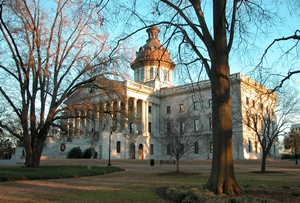 South Carolina lawmakers will return to the State House this week to deal with unfinished legislative business after legislators extended the 2018 sine die adjournment date for the General Assembly.
South Carolina lawmakers will return to the State House this week to deal with unfinished legislative business after legislators extended the 2018 sine die adjournment date for the General Assembly.
Each house stands adjourned to meet in a two-day statewide session beginning May 23 and another two-day session on June 27.
Following the June session, the General Assembly will stand in recess subject to the call of the speaker and president pro tempore.
Unless otherwise adjourned sine die at an earlier date, the 2018 session will adjourn sine not later than November 11, 2018.
Colorado Secretary of State Wayne Williams is considering amendments to the state’s campaign finance rules. A new rule would allow committees to accept contributions in the form of cryptocurrency up to the limits for cash or coin contributions. The value […]
 Colorado Secretary of State Wayne Williams is considering amendments to the state’s campaign finance rules.
Colorado Secretary of State Wayne Williams is considering amendments to the state’s campaign finance rules.
A new rule would allow committees to accept contributions in the form of cryptocurrency up to the limits for cash or coin contributions.
The value of such contributions would be the value of the cryptocurrency at the time the contributions are made.
Prior to issuing the proposed draft, the Secretary of State’s office is seeking public comments to identify potential revisions and additional guidance. Comments must be submitted by May 23.
May 21, 2018 •
West Virginia Governor Calls for Special Legislative Session
On May 18, West Virginia Gov. Jim Justice issued a call for the West Virginia Legislature to meet in special session beginning at 6 p.m. on Sunday, May 20, 2018. The special session will be held during the Legislature’s regularly […]
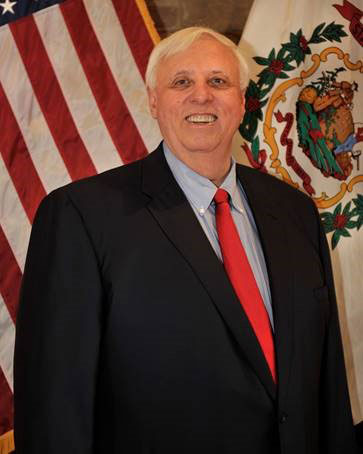 On May 18, West Virginia Gov. Jim Justice issued a call for the West Virginia Legislature to meet in special session beginning at 6 p.m. on Sunday, May 20, 2018.
On May 18, West Virginia Gov. Jim Justice issued a call for the West Virginia Legislature to meet in special session beginning at 6 p.m. on Sunday, May 20, 2018.
The special session will be held during the Legislature’s regularly scheduled interim meetings that also began Sunday. The governor’s call included eight bills for the Legislature to address.
Several are meant to clarify some pieces of recently-passed legislation while others are supplemental appropriations.
May 18, 2018 •
NYCU Video Digest – May 18, 2018
Lots of legislatures adjourned this week, find out what they did in this edition of News You Can Use Video Digest!
Lots of legislatures adjourned this week, find out what they did in this edition of News You Can Use Video Digest!
May 18, 2018 •
News You Can Use Digest – May 18, 2018
National: These Women Mostly Ignored Politics. Now, Activism Is Their Job. WRAL – Campbell Robertson (New York Times) | Published: 5/10/2018 Since retiring eight years ago as a high school French teacher, Kathy Rentz was content to spend her time […]

National:
These Women Mostly Ignored Politics. Now, Activism Is Their Job.
WRAL – Campbell Robertson (New York Times) | Published: 5/10/2018
Since retiring eight years ago as a high school French teacher, Kathy Rentz was content to spend her time gardening, knitting, and spoiling her grandchildren. Now she is the kind of person who writes “Not For Trump’s Golf Trips” across her federal tax return. The grassroots activism on the left has been powered to a large degree by college-educated women in midcareer or retirement. They often have no prior interest or experience in politics. But with the election of Donald Trump, they were aghast at how they felt the political system, which most had taken for granted to the point of indifference, had allowed things to fly so far off the rails.
Trump, Schneiderman, Greitens and the Changing Shape of Sex Scandals
Chicago Tribune – Marc Fisher (Washington Post) | Published: 5/13/2018
In politics, entertainment, sports, and other industries, the arc and impact of sex scandals are changing, and the difference centers on coercion and consent. Prominent cases have led the cultural wave, as allegations of abuse derailed the public careers of Bill Cosby, Harvey Weinstein, Charlie Rose, U.S. Senate candidate Roy Moore, and New York Attorney General Eric Schneiderman, who announced his resignation hours after he was accused of physically assaulting women. But even as politicians from both parties resign or pull away from re-election bids because of accusations they abused or coerced women, a two-year procession of allegations from women who accused President Trump of sexual improprieties has had no visible impact on his popularity.
Federal:
A Secret Mission, a Code Name and Anxiety: Inside the early days of the F.B.I.’s Trump investigation
Anchorage Daily News – Matt Apuzzo, Adam Goldman, and Nicholas Fandos (New York Times) | Published: 5/16/2018
Days after they closed their investigation into Hillary Clinton’s use of a private email server, the FBI began scrutinizing Donald Trump’s campaign. The two cases have become inextricably linked in one of the most consequential periods in the history of the bureau. The FBI sent a pair of agents in 2016 to meet the Australian ambassador to the United Kingdom, who had evidence one of Trump’s advisers, George Papadopoulos, knew in advance about Russian election meddling. The agents’ report on the interview helped provide the foundation for a case that became the special counsel investigation. But at the time, a small group of FBI officials knew it by its code name: Crossfire Hurricane.
Ethics Chief Knocks Trump Over Stormy Daniels Payment
Politico – Louis Nelson, Matthew Nussbaum, and Lorraine Woellert | Published: 5/16/2018
President Trump formally disclosed he paid his attorney as much as $250,000 as reimbursements for expenses, which included a payoff to adult film actress Stormy Daniels, who says she had a sexual encounter with Trump. The disclosure came in the president’s annual financial disclosure report to the Office of Government Ethics (OGE). Trump said he was listing the reimbursements to Michael Cohen “in the interest of transparency,” even though he was not required to disclose them. OGE Director David Apol questioned why Trump did not include this in his previous year’s disclosure and passed along his concerns to federal prosecutors. “I am providing both reports to you because you may find the disclosure relevant to any inquiry you may be pursuing,” Apol wrote to Deputy Attorney General Rod Rosenstein.
FEC Allows Candidate to Use Campaign Funds for Child Care
The Hill – Aris Folley | Published: 5/10/2018
The FEC ruled a candidate can use campaign funds to pay for child care. Liuba Grechen Shirley had petitioned the FEC for permission to pay her babysitter out of money donated to her campaign. Grechen Shirley, who previously cared for her children full time, argued she needed the sitter only for her bid for office and that the payment therefore constituted a campaign expense. The FEC noted Grechen Shirley’s child care needs were a direct result of her run for Congress and essential to her continuing a bid. Therefore, the spending would not be considered a violation of rules that prohibit personal spending.
Thousands of Pages of Congressional Testimony Shed Light on 2016 Trump Tower Meeting
MSN – Rosalind Helderman and Karoun Demirjian (Washington Post) | Published: 5/16/2018
Thousands of pages of interview transcripts released by the Senate Judiciary Committee offer the most detailed account to date of the June 2016 meeting at Trump Tower between Donald Trump Jr. and a Russian lawyer who has admitted to being an “informant” to Moscow. The documents show a constellation of efforts over several years by two powerful Russian real estate developers, Aras and Emin Agalarov, to arrange meetings and provide assistance to Donald Trump. The efforts culminated in setting up the meeting with Trump Jr. on the promise to the president’s eldest son that it would deliver political dirt on Hillary Clinton. While the documents reveal the willingness of the Trump campaign to accept the Agalarovs’ help when it was convenient, they do not show the extent to which the president was aware of the meeting’s stated purpose.
From the States and Municipalities:
Alaska: Legislature Will Boot Ballot Measure If Governor Signs ‘Government Accountability’ Bill
Juneau Empire – James Brooks | Published: 5/14/2018
If signed into law by Alaska Gov. Bill Walker, House Bill 44 will prohibit lawmakers from accepting per diem after Day 121 of the legislative session if a budget has not been approved. Lawmakers will also be required to disclose financial conflicts-of-interest in committee, not just on the floor, and lobbyists will be further restricted from providing meals and drinks to legislators. Amendments to the legislation make it “substantially similar” to an ethics reform ballot measure. Under the Alaska Constitution, an initiative may be removed from the ballot if the Legislature passes a bill that is “substantially the same” as the initiative.
Arizona: Arizona Lawsuit Says Measure Undermines Clean Elections
KNAU; Associated Press – | Published: 5/16/2018
A lawsuit claims a ballot referendum eviscerates the authority of the state’s Citizens Clean Elections Commission. The agency administers public financing of elections. A ballot referendum that passed earlier this year would ask voters if they want to put the commission’s rulemakings under the oversight of the Governor’s Regulatory Review Council, which is staffed by gubernatorial appointees. The suit says the commission has independent rulemaking authority by design, since it regulates politicians.
Arkansas: Arkansas Judge Who Blocked TV Ads Removing Himself from Case
Sacramento Bee – Andrew DeMillo (Associated Press) | Published: 5/16/2018
Washington County Circuit Court Judge Doug Martin, who ordered that negative political ads against Arkansas Supreme Court Justice Courtney Goodson be pulled off the airwaves recused himself from further involvement in the case. The temporary restraining order by Martin still stands, however. Martin had reported receiving income through his wife from the law firm of Goodson’s husband. Justice Goodson is fighting a legal battle in Arkansas’ largest media markets against what she says are “defamatory” ads being run by an out-of-state group that does not disclose its donors.
Florida: It Was Supposed to Show Who Profited from Public Money. But the Rule Wasn’t Enforced
Miami Herald – Elizabeth Koh | Published: 5/10/2018
Records show despite an ethics rule that requires lobbyists for taxpayer-funded entities to submit lobbying contracts to the Florida House, the rule has not been enforced. The House’s much vaunted web page was not updated for a year and some lobbyists neglected for months to comply with the required disclosures. Today, the web page still includes outdated data on lobbying expenditures made by local governments and remains incomplete. At one point, the backlog left hundreds of documents off the books in the last two years.
Maryland: Mayor Pugh Seeks Broad Ethics Exemption to Raise Private Money to Fund Baltimore Programs
Baltimore Sun – Ian Duncan | Published: 5/15/2018
Baltimore Mayor Catherine Pugh wants to be exempted from city ethics rules that require officials to obtain approvals before soliciting private funds for community programs and events. Calling Baltimore “a poor city,” City Solicitor Andre Davis questioned the constraints on the mayor’s ability to solicit monetary assistance. The ethics rules are designed to ensure transparency around gifts and charitable support that officials receive from individuals and businesses they may wield influence over in the course of their duties. In addition to seeking approval up front, officials are required to submit reports detailing fundraising activities.
Missouri: Case Against Greitens Is Dropped, for Now. Legislative Leaders Say Nothing’s Changed
Kansas City Star – Bryan Lowry, Jason Hancock, Kelsey Landis, Allison Kite, and Steve Vockrodt | Published: 5/14/2018
Prosecutors dropped an invasion-of-privacy charge against Missouri Gov. Eric Greitens but still hope to pursue a case against him for allegedly taking a revealing photograph of a woman with whom he was having an affair. The move came after the judge granted a request by Greitens’ lawyers to call the case’s prosecutor, Kim Gardner, as a witness for the defense. The defense team has criticized Gardner’s handling of the case. “The court’s order places the circuit attorney in the impossible position of being a witness, subject to cross-examination, [including by her own subordinates],” a Gardner spokesperson said. Greitens remains charged for allegedly using a donor list from a charity in his gubernatorial campaign. The Legislature will convene a special session to consider whether to initiate impeachment proceedings against Greitens.
Missouri: Donors Behind Political Cash Cannot Be Concealed, Ethics Watchdog Says
St. Louis Post-Dispatch – Sky Chadde | Published: 5/10/2018
The Missouri Ethics Commission issued an advisory opinion stating nonprofits that contribute to campaigns cannot conceal the identities of their donors. The opinion targets so-called dark money groups, who do not have to disclose their donors, making the origin of the funds nearly impossible to determine. Their use has increased in recent years and one prominent organization that has employed the tactic is A New Missouri, a nonprofit created to promote Gov. Eric Greitens’ agenda.
New York: Jury Finds Silver Guilty
Albany Times Union – Benjamin Weiser (New York Times) | Published: 5/11/2018
For a second time, a jury convicted former New York Assembly Speaker Sheldon Silver on corruption charges. Prosecutors accused him of a scheme in which a physician referred possible asbestos lawsuit plaintiffs to him in exchange for $500,000 in state grants. Silver passed on the clients to a law firm, which paid him more than $3 million in referral fees. He was also convicted of accepting $700,000 in fees from a real estate law firm after he steered business to the firm from two developers who benefited from his activities at the statehouse. Silver’s initial conviction was among a number of cases that were overturned after the U.S. Supreme Court narrowed the activity that could constitute corruption.
Oklahoma: Oklahoma Ethics Commission Votes to Sue Over Budget
The Oklahoman – Nolan Clay | Published: 5/12/2018
Unhappy with its appropriation, the Oklahoma Ethics Commission voted to pursue a lawsuit over the matter. Commission Executive Director Ashley Kemp would not say if the suit was related to concerns over funding or who would be named as defendant. But the commission has been vocal about its dissatisfaction on how the Legislature handled its funding. Kemp said the agency was upset about its appropriation. The Legislature swept the agency’s revolving funds, which include fees assessed by the commission, rather than making an appropriation from the general revenue fund.
Gov. John Bel Edwards announced this week that the Louisiana Legislature will adjourn Friday, three weeks ahead of its scheduled date of adjournment. An early end to the regular legislative session will allow Legislators to convene in a special legislative […]
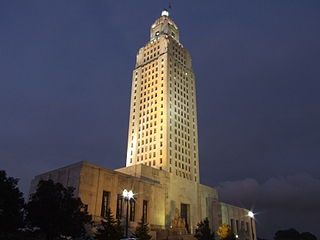 Gov. John Bel Edwards announced this week that the Louisiana Legislature will adjourn Friday, three weeks ahead of its scheduled date of adjournment.
Gov. John Bel Edwards announced this week that the Louisiana Legislature will adjourn Friday, three weeks ahead of its scheduled date of adjournment.
An early end to the regular legislative session will allow Legislators to convene in a special legislative session scheduled to start on May 22.
The special session to address the state’s budget crisis will adjourn no later than June 4, the scheduled adjournment date of the regular session. At stake is $648 million in temporary taxes set to expire on July 1.
A February special session aimed at the budget failed to pass any taxes to close the budget gap.
The San Francisco, California Board of Supervisors unanimously passed, on first reading, campaign finance reform legislation aimed at providing more transparency in political contributions. Among other provisions, the legislation will include pay-to-play provisions, local behested payment reporting requirements for both […]
 The San Francisco, California Board of Supervisors unanimously passed, on first reading, campaign finance reform legislation aimed at providing more transparency in political contributions.
The San Francisco, California Board of Supervisors unanimously passed, on first reading, campaign finance reform legislation aimed at providing more transparency in political contributions.
Among other provisions, the legislation will include pay-to-play provisions, local behested payment reporting requirements for both donors and City officers, and additional disclosure requirements for contributions made by business entities.
The legislation must pass a second reading at the Board of Supervisors and be signed by the mayor prior to becoming law.
May 17, 2018 •
Vermont Governor Calls Special Session
Gov. Phil Scott called a special session for May 23, 2018. The governor is planning to veto the state budget and property tax bills passed during the regular session. Gov. Scott has promised to veto any legislation that increases taxes […]
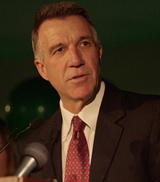 Gov. Phil Scott called a special session for May 23, 2018. The governor is planning to veto the state budget and property tax bills passed during the regular session.
Gov. Phil Scott called a special session for May 23, 2018. The governor is planning to veto the state budget and property tax bills passed during the regular session.
Gov. Scott has promised to veto any legislation that increases taxes or fees. If vetoed, the Legislature has until the end of June to pass a spending bill before the new fiscal year commences on July 1.
Lawmakers hope Gov. Scott will sign the current bills and make the special session unnecessary.
State and Federal Communications, Inc. provides research and consulting services for government relations professionals on lobbying laws, procurement lobbying laws, political contribution laws in the United States and Canada. Learn more by visiting stateandfed.com.

